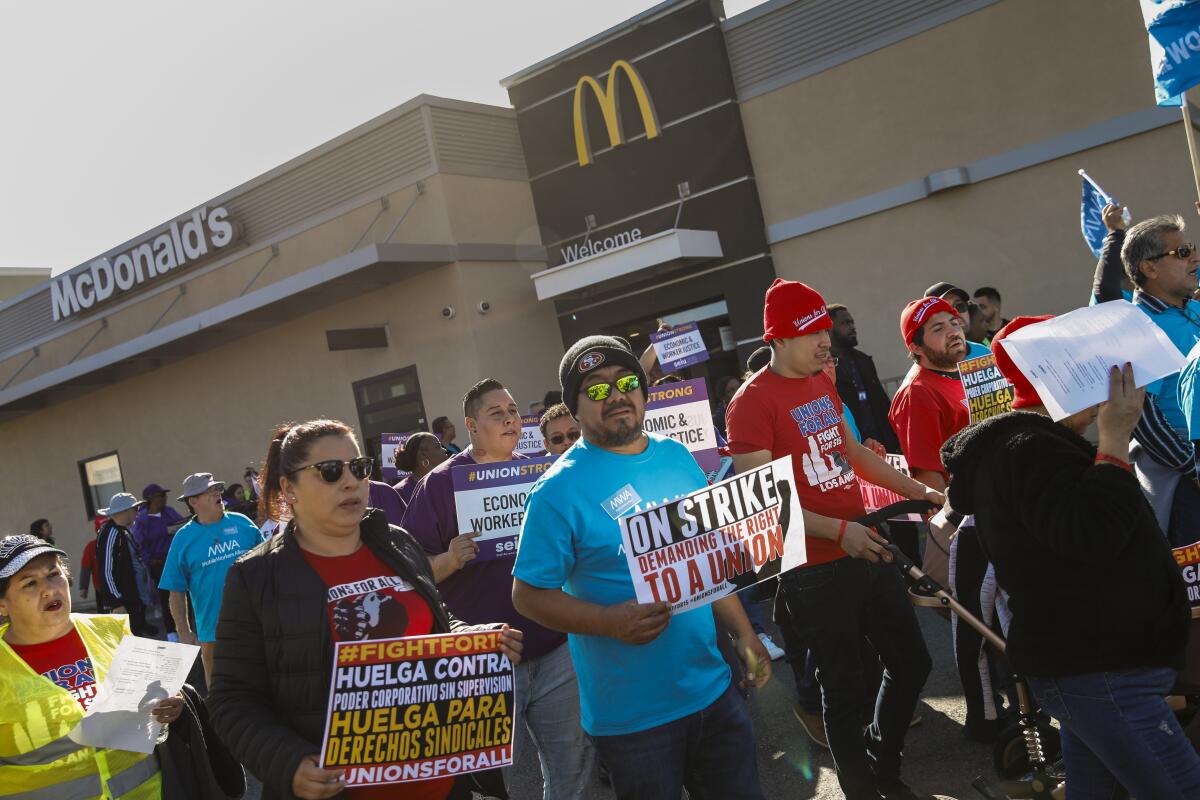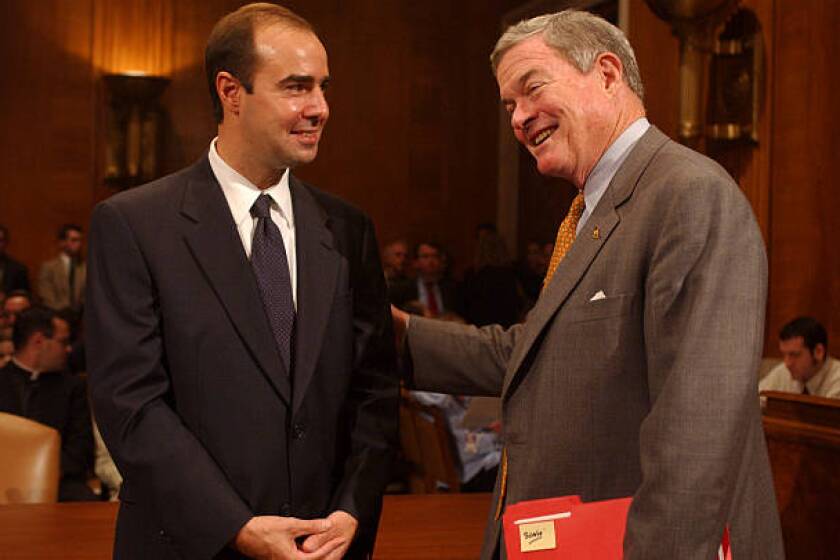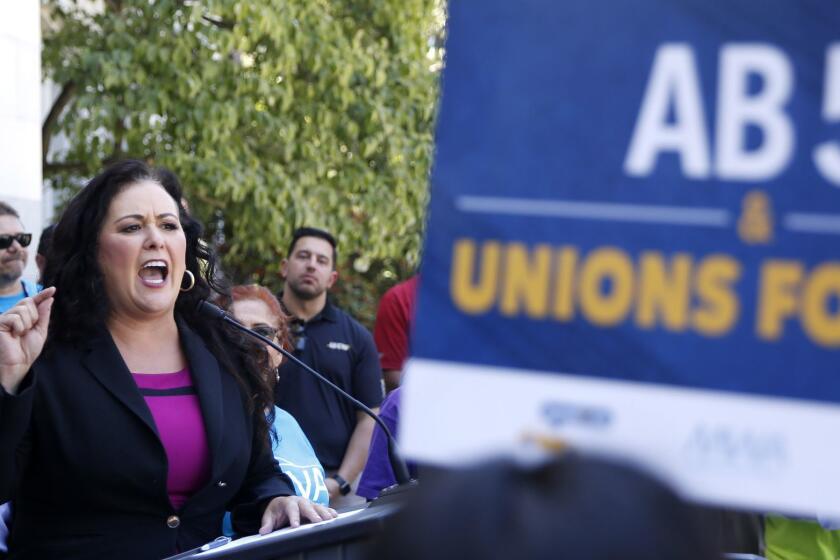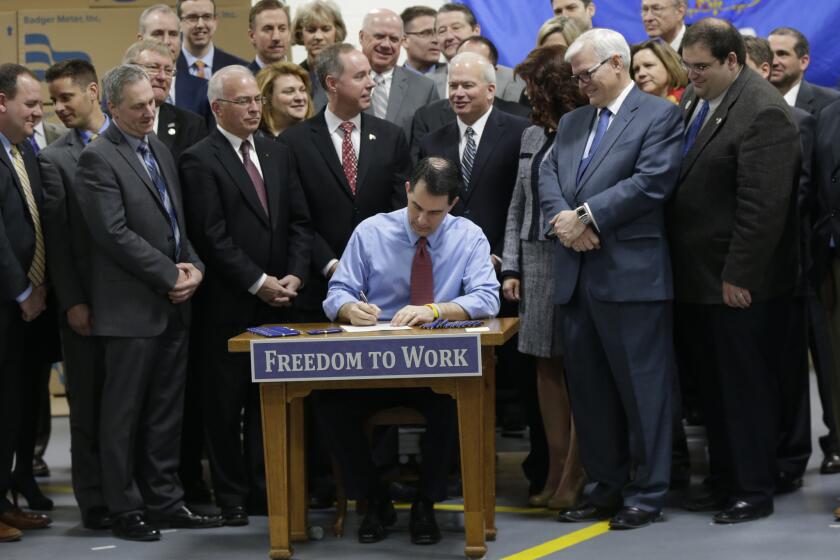Column: Trump’s labor regulators hand McDonald’s a big win over its workers

- Share via
In another sign that the true damage wreaked on the lives of ordinary Americans by the Trump administration takes place in the deeps of government agencies, the National Labor Relations Board has just issued a decision significantly narrowing the right of franchise workers to force big companies to take responsibility for their working conditions.
The chief beneficiary of the decision — possibly the only beneficiary — is McDonald’s, which has been fighting for years against the notion that it bears any such responsibility for the more than 800,000 workers on the front lines and the back-of-the-store grills of 14,000 McDonald’s restaurants, almost all of which are owned by franchisees.
On the surface, the decision handed down Thursday affects only 20 McDonald’s workers who were the subject of unfair labor practice complaints the NLRB filed against the giant company in December 2014. But it gives McDonald’s a major victory over the threat that it might share a duty to franchise employees, or that workers might have an easier path to unionization.
A finding of joint-employer status...would have important collateral consequences for McDonald’s, in both unfair labor practice proceedings involving its franchisees and...if workers employed at McDonald’s franchisees sought to organize.
— NLRB member Lauren McFerran (in dissent)
Of the 20 workers directly affected, three said they had been illegally fired and 17 others said they had been suspended or had their hours slashed because of their activity on behalf of the Fight for $15 movement, which aimed to pressure McDonald’s into raising the wages of its restaurant workers.
But the Obama-era NLRB had originally broadened the case to allege that McDonald’s and numerous franchisees had broken the law by “threatening employees, ...interrogating them, and surveilling” their legal union organizing activities.
The NLRB’s goal at the time was to classify McDonald’s as a “joint employer” with its franchisees, which would make the company jointly liable for the labor law violations of the franchise owners.
Under Trump, the NLRB ended the cases with a series of settlements with franchisees providing for back pay for the workers who were fired or had their hours reduced. The workers shared a settlement fund of $171,636, and the franchisees were required to establish another $250,000 fund to cover future violations. But the settlements didn’t impose joint liability on McDonald’s.
Trump’s evisceration of labor protections will continue under Labor Department nominee Scalia
When the settlements came before the NLRB administrative law judge overseeing the cases, she balked. Among other points, she found that the agreements didn’t “in any way approximate the remedial effect” of a joint-employer finding, the Obama-era NLRB’s main goal.
At the time of the ruling, the NLRB comprised four members, with one seat vacant. Three were Trump appointees and the fourth, Lauren McFerran, an Obama appointee. The McDonald’s ruling was decided 2 to 1 with McFerran dissenting and board Chairman John F. Ring not participating. McFerran’s term expired Dec. 16, and no successor has been named.
In its decision, the Trump majority overruled the judge, fully buying into the argument posed by McDonald’s and its franchisees that the latter are “small businesses with limited resources...unjustly embroiled in costly and time-consuming litigation” merely because of the former board’s determination to establish McDonald’s as a joint employer.
In an emailed statement, McDonald’s told me it was “pleased” by the decision, which it said “allows our franchisees and their employees to move forward, and resolves all matters without any admission of wrongdoing.”
The impact of this decision on workers at McDonald’s or similar franchise businesses can’t be overstated. As McFerran observed in her dissent, “a finding of joint-employer status...would have important collateral consequences for McDonald’s, in both unfair labor practice proceedings involving its franchisees and...if workers employed at McDonald’s franchisees sought to organize” (that is, unionize).
Juan Lara was headed back to the Port of Los Angeles two weeks ago from his daily pickup in the Mojave Desert when his truck erupted with engine trouble.
The big company claims that it has virtually no control over the franchisees wage rates or workplace conditions, even though any McDonald’s customer knows from the nearly identical customer experience nationwide that McDonald’s must exercise rigorous control over the individual restaurants.
Placing workplace responsibility where it belongs — with the deep-pocketed parent — has been a goal of worker advocates and union organizers for good reason.
A 2014 decision by Richard Griffin, then the NLRB general counsel, designating McDonald’s a joint employer, was seen as a harbinger of decisions that would impose workplace responsibility on parent companies not merely of other fast-food chains, but cleaning companies and other firms that relied on temp agencies or other subcontractors. This would give labor regulators a valuable tool to fight workplace abuses.
Griffin’s ruling was celebrated by labor advocates. “It gives workers a significant legal tool in their fight for a $15 hourly wage in fast food and is likely to have a domino effect across the subcontracted, temporary, outsourced, and franchised economy,” observed labor historian Erik Loomis. “Corporations have spent decades coming up with shady labor practices in order to avoid responsibility for workers, leading to rampant exploitation of workers with no hope of rising toward a middle class.”
It was clear almost from the first that the California Supreme Court, in a ruling in April 2018, threw the business models of Uber and Lyft companies for a loop.
The most important decision in this battle came in 2015, when the NLRB ruled that Republic Services, the owner of a landfill and recycling center in the Silicon Valley town of Milpitas, was the joint employer of a couple of hundred sorters and other blue-collar workers who were nominally employed by a labor outsourcing firm, Leadpoint. The ruling is known as Browning-Ferris, after the original operator of the facility.
The board found that Republic’s control of the workplace was indisputable, despite the claim that Leadpoint was the employer. Republic dictated the Leadpoint workers’ training and qualifications, required hirees to pass its drug tests and reserved the right to force Leadpoint to fire any worker the senior company didn’t like.
Corporate lobbyists predictably vented their outrage. The pro-employer Competitive Enterprise Institute, for example, predicted that the decision would have a “devastating impact on American employers and employees” by hurting “anyone who now benefits from flexible work arrangements.”
Just as predictably, the advent of a GOP majority on the labor board placed Browning-Ferris in danger. The campaign against the joint employer standards by the Trump NLRB soon assembled a discreditable history. As McFerran, the lone Democrat on the current NLRB, observed in dissenting from the McDonald’s decision, current General Counsel Peter Robb “has been unrelenting...in his attacks on Browning-Ferris.”
The most anti-union law in the U.S. is the 1947 Taft-Hartley Act. It should be repealed.
Robb, a Trump appointee, had spent much of his career as a management attorney. He played a significant role in the Reagan administration in breaking the Professional Air Traffic Controllers Organization, or PATCO, the air traffic controllers union, during its strike in 1981. On Dec. 1, 2017, after taking office as general counsel, he issued a lengthy memo signaling his intention to roll back several Obama-era pro-labor initiatives, including Browning-Ferris.
Only two weeks after that, the now-majority Republican board overturned Browning-Ferris in a ruling known as Hy-Brand, after the construction company that was its target. But the board had to vacate that ruling after its inspector general ruled that board member William Emanuel, also a Trump appointee, committed an ethics violation by failing to recuse himself, since he had been a member of the law firm that represented Browning-Ferris.
When Hy-Brand was decided a second time, also in favor of the company, the ruling did not involve the joint-employer rules.
Labor organizations challenged Emanuel’s participation in the McDonald’s case, on grounds that his former law firm had worked with McDonald’s and franchisees to counter the Fight for $15 campaign. The board found that because no party in the case was a former client of Emanuel himself, he was not bound to recuse himself.
More to Read
Inside the business of entertainment
The Wide Shot brings you news, analysis and insights on everything from streaming wars to production — and what it all means for the future.
You may occasionally receive promotional content from the Los Angeles Times.














